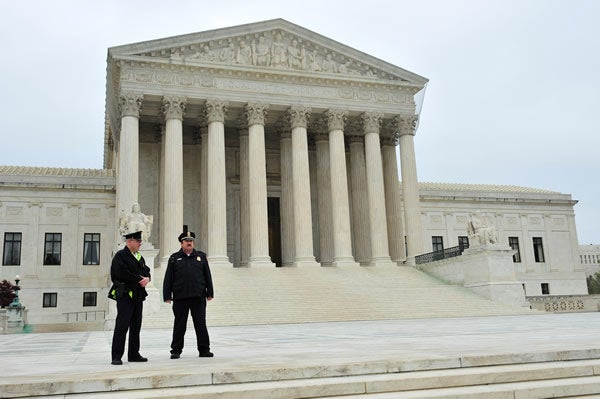Obamacare’s day in court didn’t go so well, and liberals are in a panic. Sensing the demise of Obamacare, they have begun to preemptively accuse the conservative justices of “judicial activism.”
But the more they try to explain how striking down Obamacare would be “judicial activism,” the clearer it is that the left thinks “judicial activism” is a failure to advance liberalism.
Case in point: On Monday, Obama “warned” the Supreme Court against judicial activism, saying that overturning his health law “would be an unprecedented, extraordinary step of overturning a law that was passed by a strong majority of a democratically elected Congress.” But every law that has ever been struck down has had the majority support of the legislature (a constitutional requirement). Thus the Court’s striking down Obamacare could not possibly be “unprecedented” or “extraordinary.”
Obama then claimed that striking down Obamacare would be “a good example” of judicial activism since it would mean that “an unelected group of people would somehow overturn a duly constituted and passed law.” It is certainly a relief to see Obama concerned about the power of unelected officials—if only he would turn his attention to the vastly power delegated to unelected bureaucrats in executive agencies—but in this case, Supreme Court justices are supposed to be unelected in order to provide a check against the popular branches. If anything, concern for congressional will should lead the Court to strike down the entirety of Obamacare. Justice Kennedy, for example, suggested that the Court would show more judicial restraint by throwing out the entire law rather than having the justices choose which particular parts of the law could stay without the mandate.
Obama’s claim that Obamacare is sacrosanct because it is a “duly constituted and passed law” reveals further fuzziness of logic. That a law was passed in a constitutional manner in no way ensure that it is constitutional. Congress and the President could, for example, follow the constitutional process to a “t” when passing a law prohibiting the publication of newspapers, but it would still be unconstitutional.
Ironically, if Obama actually believed his arguments, he would have to oppose many of the left’s favorite cases, such as Roe v Wade, which struck down democratically and properly enacted laws.
Ultimately, there are only two standards on which one can base judicial decisions: the Constitution itself or politics. If evolving political trends is the standard by which cases are decided, then justices are free to appeal to whatever spurious doctrines (constitutional “penumbras,” anyone?) further their cause, and liberals cannot complain when conservatives win the day.
But, of course, politics was never meant to be the guiding judicial principle. Rather, judges are supposed to make decisions based on a proper understanding of the meaning of the Constitution’s text as it was written and publicly understood at the time of ratification—a method commonly referred to as originalism. Judges are activist only if (but also whenever) they make decisions not based on the text of the Constitution.
